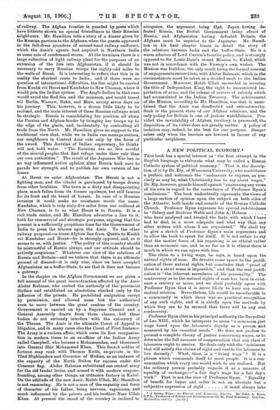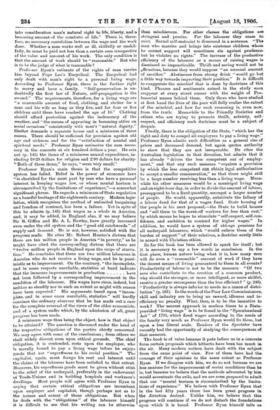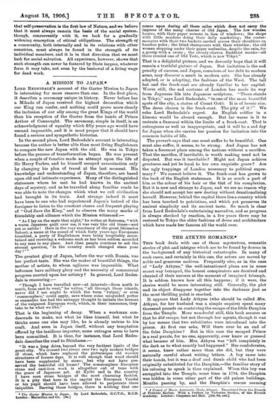A NEW POLITICAL ECONOMY.*
Tam book has a special interest as " the first attempt in the English language to elaborate what may be called a Roman Catholic system of political economy." That is the descrip- tion of it by Dr. Ely, of Wisconsin University, who contributes a preface, and welcomes the "endeavour to express, as pre- cisely as may be, what. Christianity has to say about wages." Dr. Ely, however, guards himself against "expressing any views of his own in regard to the correctness of Professor Ryan's conclusions." The book undoubtedly represents the views of a large section of opinion upon the subject on both sides of the Atlantic, both inside and outside of the Roman Catholio Church. Professor Ryan expresses his special indebtedness
to "Sidney and Beatrice Webb and John A. Hobson who have analysed and treated the facts, with which I have had to deal, in a more adequate and vital way than any other writers with whom I am acquainted." We shall try to give a sketch of Professor Ryan's main arguments and to allow the book to speak for itself. It is not unfair to say that the motive force of his reasoning is an ethical rather than an economic one, and in so far as it is ethical there is much in which we can agree with him.
The claim to a living wage, he says, is based upon the natural rights of man. He devotes some space to the justifi- cation of these natural rights, but concludes that " proof of them in a strict sense is impossible," and that the real justifi- cation is "the inherent sacredness of his personality." The controversy as to the natural rights of man has been in exist- ence a century or more, and we shall probably agree with Professor Ryan that it is never likely to have any mathe- matical solution. Nevertheless, life would be unendurable in a community in which there was no practical recognition of any such rights, and it is chiefly upon the methods by which they are to be secured that there will be any real controversy.
Professor Ryan cites as his principal authority the Encyclical of Leo XIII., which he interprets to mean "a minimum just wage based upon the labourer's dignity as a person. and measured by his essential needs." He does not profess to present a complete theory of justice concerning wages, or to determine the full measure of compensation that any class of labourers ought to receive. He deals only with the "minimum that will satisfy the claims of right and enable the labourer to live decently." What, then, is a " living wage " ? It is a phrase which commends itself to most people. It is a con- summation which every one would wish to see realised. But the ordinary person probably regards it as a measure of equality of exchange,—" a fair day's wage for a fair day's work." That is not the view of Professor Ryan. "Equality of benefit for buyer and, seller is not an absolute but a
subjective expression of right it must always take
A Living Wage: its Ethical and Economic .Aspeets. By 'John A. Ryan, S.T.L.. Professor of Ethics and Economics in the St. Paul Seminary. London: Macmilkut and Co. [is. G.1.1
into consideration man's natural right to life, liberty, and a becoming amount of the comforts of life." There is, there- fore, no necessary correlation between the wage and the work done. Whether a man works well or ill, skilfully or unskil- fully, he must be paid not less than a certain sum irrespective of the value and amount of his work. The only condition is that the amount of work should be " reasonable." But who is to be the judge of what is reasonable ?
Professor Ryan's estimate of the rights of man carries him beyond Pope Leo's Encyclical. The Encyclical had only dealt with man's right to a personal living wage.
According to Professor Ryan, there is the further right to marry and have a family. " Self-preservation is un-
doubtedly the first law of Nature, self-propagation is the second." The requirements, therefore, for a living wage are " a reasonable amount of food, clothing, and shelter for a man and his wife as long as they live, and for four or five children until these have reached the age of 16." Clothing should afford protection against the inclemency of the weather, and "the means of appearing in becoming attire on social occasions" consistently with man's " natural dignity." Shelter demands a separate house and a minimum of three rooms. There should be sufficient for provision against old age and sickness and for the " satisfaction of mental and spiritual needs." Professor Ryan estimates the sum neces- sary in the concrete at six hundred dollars a year. He sets out (p. 145) the items of a minimum annual expenditure, in- cluding 10.29 dollars for religion and 2.80 dollars for charity.
Both of these items," he says, " seem very small."
Professor Ryan's main thesis is that the competitive system has failed. Belief in the power of economic laws "is cherished for the most part by men who have a personal interest in keeping wages low, or whose mental horizon is circumscribed by the limitations of experience,"—a somewhat significant phrase. He regards a minimum of State regulation as a baneful heritage of the eighteenth century. Modern legis- lation, which recognises the method of unlimited bargaining and freedom of contract, has been a failure. Yet in spite of this he admits (p. 145) that wages as a whole in America, and, it may be added, in England also, if we may believe Sir R. Giffen and Mr. A. L. Howley, have greatly increased even under the old system and the " good old catchwords " of supply and demand. He is not, however, satisfied with the progress made. He cites Mr. Robert Hunter's dictum that there are ten million people in America "in poverty," as he might have cited the corresponding dictum that there are " twelve million people in England upon the verge of starva- tion." He concludes that there are two million labourers in America who do not receive a living wage, and he is pessi- mistic as to improvement. On the contrary, " the incomplete, and in some respects unreliable, statistics at hand indicate
that the immense improvements in production have not been followed by a corresponding improvement in the condition of the labourer. His wages have risen, indeed, but neither so steadily nor to such an extent as might with reason have been expected." His arguments based upon "incom- plete, and in some cases unreliable, statistics " will hardly convince the ordinary observer that he has made out a case for the complete reversal of the views of the older economists, and of a system under which, by the admission of all, great progress has been made. A minimum wage thus being the object, how is that object to be attained P The question is discussed under the head of the respective obligations of the parties chiefly concerned. We may agree with some of the conclusions ; from others we shall widely dissent even upon ethical grounds. The chief obligation, it is contended, rests upon the employer, who is morally bound to pay a living wage before he enjoys goods that are "superfluous to his social position." The capitalist, again, must forego his rent and interest until the claims of the labourer have been satisfied to that extent. Moreover, his superfluous goods must be given without stint to the relief of the underpaid, preferably in the endowment of Trade-Unions and in building hospitals and workmen's dwellings. Most people will agree with Professor Ryan in urging that certain ethical obligations are incumbent upon employer and capitalist, though perhaps not as to the nature and extent of those obligations. But when he deals with the " obligations " of the labourer himself it is difficult to see that his writing can be otherwise than mischievous. For other classes the obligations are stringent and precise. For the labourer they cease to
exist. Sexual self-restraint is dismissed in a sentence. "The man who marries and brings into existence children whom he cannot support will sometimes sin against prudence, but he violates no rights." The increase of the productive efficiency of the labourer as a means of raising wages is dismissed as impracticable. Thrift and saving would not be efficacious, because they would suppose "an unusual amount of sacrifice." Abstinence from strong drink " would go but a little way towards improving their position." It is difficult to exaggerate the mischief that is done by doctrines of this kind. Phrases and sentiments coined in the study soon reappear at every street corner with the weight of Pro- fessorial names behind them. Only those who have studied at first hand the lives of the poor will fully realise the extent of the mischief, and how far such reasoning is, even now, from the truth. Meanwhile to the Friendly Societies and others who are trying to promote thrift, sobriety, self- respect, and efficiency such doctrines must be a subject of despair.
Finally, there is the obligation of the State, "which has the right and duty to compel all employers to pay a living wage." Professor Ryan admits such difficulties as a general rise of prices and decreased demand, but again quotes authority to show that they are not insuperable. He cites the Australian legislation in that direction, but admits that it has already " driven the less competent out of employ- ment," and that any such measure " requires a provision by which the less competent can obtain legal authorisation to accept a smaller remuneration," so that there might still be a large number receiving less than a living wage. Mean- while his other measures would be a municipal living wage and an eight-hour day, in order to divide the amount of labour, presupposed to be a fixed quantity, amongst a larger number of people. He would, apparently, substitute the fallacy of a labour fund for that of a wages fund. State housing of the people is his next proposal,—the State to build houses and "sell them to the worst-off workers for less than cost," by which means he hopes to stimulate " self-respect, self-con- fidence, and ambition to contend for higher wages." In addition, he would have a system of old-age pensions for all underpaid labourers, which " would relieve them of the burden of support" of their relatives, a doctrine surely little in accord with Christian ethics.
So far the book has been allowed to speak for itself ; but it is necessary to say a few words in conclusion. In the first place, human nature being what it is, how many men will do even a " reasonable " amount of work if they have the decent means of living guaranteed to them in all events P Productivity of labour is not to be the measure. "Of two men who contribute to the creation of a common product, why should the stronger, or more intelligent, or more skilful, receive a greater recompense than the less efficient P " (p. 248). " Productivity is always inferior to needs as a canon of distri- bution" (p. 261). In the words of the Poor Law Commissioners, skill and industry are to bring no reward, idleness and in- efficiency no penalty. What, then, is to be the incentive to work P The nearest approach in modern times to a State- provided "living wage " is to be found in the " Speenhamland Act" of 1795, which fixed wages according to the needs of the family very much as Professor Ryan would fix them, but upon a less liberal scale. Readers of the Spectator have recently had the opportunity of studying the consequences of that measure.
The book is of value because it puts before us in a concrete form certain proposals which hitherto have been too mnoh is the air. Many modern writers have dealt with the subject from the same point of view. Few of them have had the courage of their opinions to the same extent as Professor Ryan. If we disagree with him, we do so not because we are less anxious for the improvement of social conditions than he is, but because we believe that the methods advocated by him would accentuate the evils, and we are even prepared to admit that our " mental horizon is circumscribed by the limita- tions of experience." We believe with Professor Ryan that in the last fifty years there has been great progress in the direction desired. Unlike him, we believe that this progress will continue if we do not disturb the foundations- upon which it is based. Professor Ryan himself tells us
that self-preservation is the first law of Nature, and we believe that it must always remain the basis of the social system, though, concurrently with it, we look for a gradually widening conception of ethical obligations. The strength of a community, both internally and in its relations with other countries, must always be found in the strength of its individual members, and it is in that direction that we must look for social salvation. All experience, however, shows that such strength can never be fostered by State largess, whatever form it may take, not even by the bestowal of a living wage for dead work.




































 Previous page
Previous page